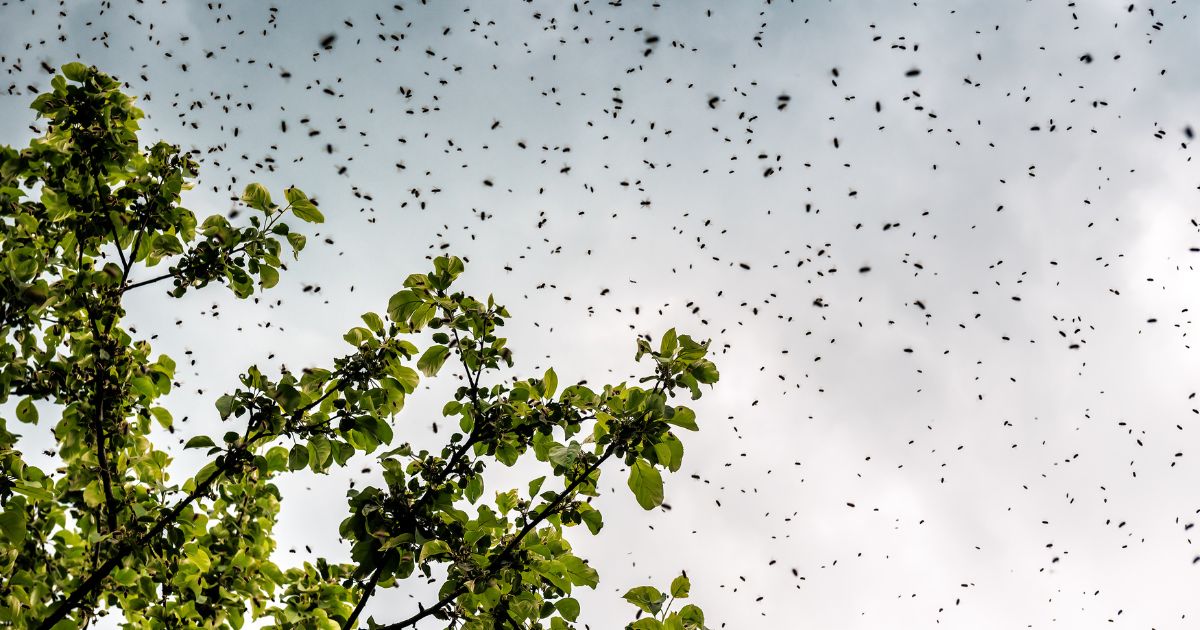Bee Swarms In Melbourne, Victoria
Curious about bee swarms and when they occur in Melbourne? What should you do if you find a bee swarm? Keep reading to find out!

Have you ever seen a bee-armageddon? Sounds extreme, but it’s exactly what it looks like when bees are swarming! At first, it looks like a snowstorm of bees, until they settle and bunch up in a new location.
Below I’ll answer some common questions about bee swarming in Melbourne, Victoria, and how I can help with bee swarm removal.
Why do bees swarm all of a sudden?
Swarming is a natural part of the lifecycle of honey bees. It allows a hive to reproduce, colonise new territory, and take advantage of abundant sources of food.
In preparation for swarming, the queen bee lays eggs into special ‘queen cups’ created by the workers. New virgin queens will emerge from these cells, enabling the colony to split.
The honey bee swarm consists of the old queen together with approximately half of the worker bees. The workers will stop feeding the queen prior to swarming, otherwise, she is simply too heavy to fly any distance!
Scouts will seek out a nearby location where the swarm can cluster temporarily. In Melbourne’s urban environment, this often consists of a fence post, the branch of a tree, or other familiar object. From there, the scouts will search for a suitable permanent home for the new colony.
Scouts communicate their level of excitement about a prospective home site via a dance. When the majority of scouts have agreed upon a location, the swarm will move a second time.
European Honeybees commonly prefer a sheltered, darkened space in which to build their nest, but in Melbourne’s relatively mild weather, they may choose an exposed position. Their new home may be more than a kilometre from the original hive… or it may be in the next street.
Sometimes, when an agreement cannot be reached on a suitable site within a few days, the temporary camp can become the permanent home for the new hive by default.
Swarming puts the bees at considerable risk, as they leave their original hive with no provisions other than the nectar in their stomachs. Swarms can face starvation, mainly if the weather changes dramatically – and Melbourne residents are very familiar with this phenomenon!
The tendency to swarm differs between the various types of honey bees. In Melbourne, it’s the European Honeybee that is most often encountered. Honey bees are generally not inclined to be aggressive when swarming, but will defend themselves vigorously if required.
What should I do if I find a swarm of bees?
If you find a swarm on your property, you should take some simple precautions: do not aggravate the bees or attempt to remove the swarm in any way; avoid the immediate vicinity of the swarm; keep children and pets away; and ensure that you use appropriate footwear outdoors, in case you step on a bee.
Lastly, you should contact an experienced beekeeper, or apiarist, as soon as possible. A beekeeper is a much better option than calling pest control, who will kill the bees without attempting to relocate them.
It’s a relatively simple matter for an experienced person to remove and relocate a swarm from a temporary encampment. Once the bees have chosen a permanent home, however, this can become far more difficult – especially since European Honeybees often display a preference for wall cavities.
Fortunately, in Melbourne, an experienced beekeeper (like myself – find out more about bee removals) can safely relocate the swarm, usually within 24 hours, with minimal disruption and no harm to the bees themselves.
What time of year do bees swarm in Victoria?
Swarming normally occurs in warm weather during spring; in Melbourne, Victoria, this is typically between September and December, although on rare occasions honey bees will swarm at other times of the year.
—
Find out more about bee swarm removal in Melbourne or send a text message to Ben on 0437 077 792. If you can, include photos of the swarm as well as the swarm location.

